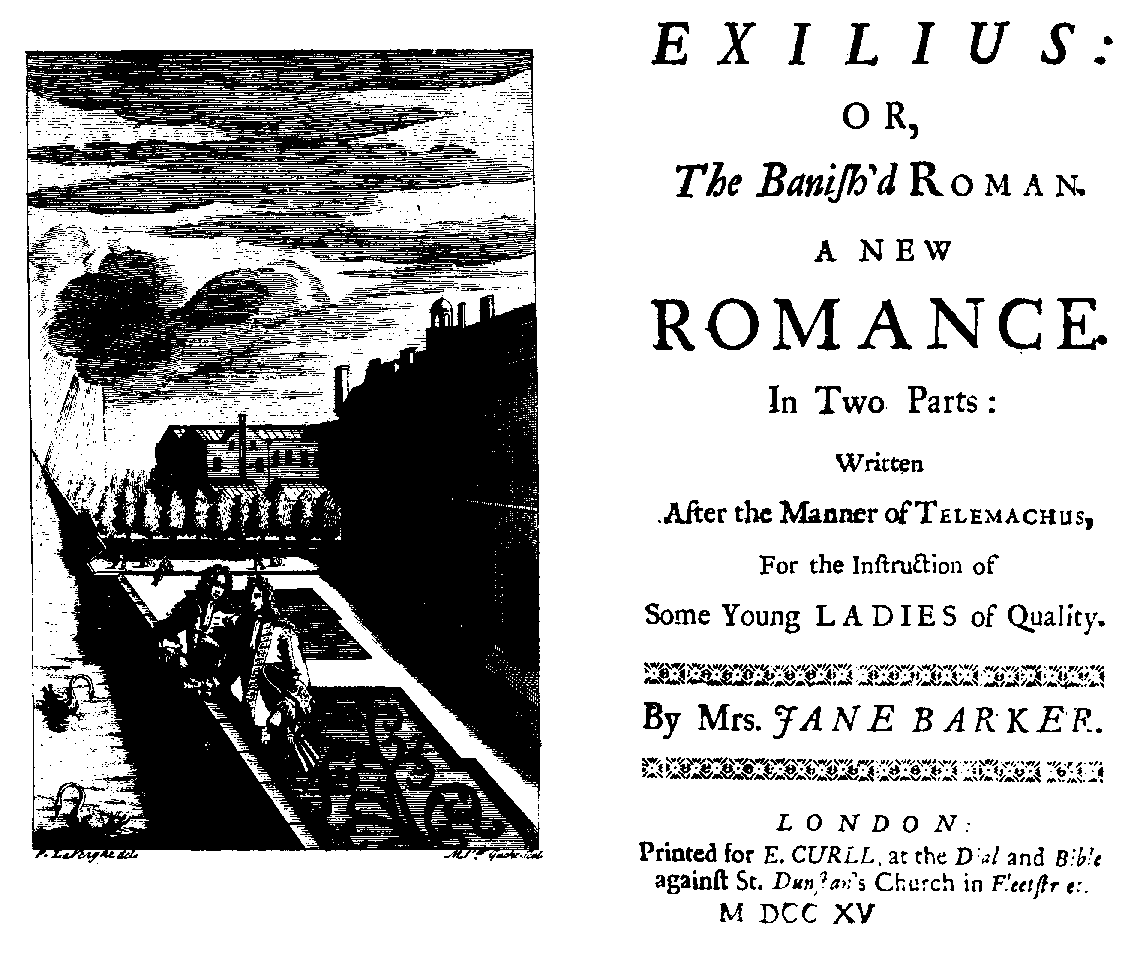![]() The Novel
The Novel
http://pierre-marteau.com/novels.html![]()

EXILIUS:| OR,| The Banish'd Roman.| A NEW| ROMANCE.| In Two Parts:| Written| After the Manner of Telemachus,| For the Instruction of| Some Young LADIES of Quality.| [line of typographical ornaments]| By Mrs. JANE BARKER.| [line of typographical ornaments]| LONDON:| Printed for E. CURLL at the Dial and Bible| against St Dunstan's Church in Fleetstreet| M DCC XV.
[2. sep. pag. Pts.] 1: frontispiece [taken from: The Adventures of Rivella (London [E. Curll], 1714)![]() ] title page in verso: books published by J. Barker, Bosvil and Galesia (E. Curll)/ [6] pp. preface
] title page in verso: books published by J. Barker, Bosvil and Galesia (E. Curll)/ [6] pp. preface![]() / p.1-172/ 2: new title page "Pt. II"/ p.3-142/ 12°.
/ p.1-172/ 2: new title page "Pt. II"/ p.3-142/ 12°.
{L: 012611.h.25}
ESTC: t064727.
Barker, Jane (1652-c.1727).
The courageous title - Barker dared to advertise "A new Romance" after the Manner of [Chaucer's Tales and] Fénelon's Telemachus - failed on the market. Remaining copies were sold in 1719 (b) as a "second edition" and in a new volume together with her Love Intrigues: or, The History of the Amours of Bosvil and Galesia [...] written by a young Lady (London: E. Curll/ C. Crownfield, 1713)![]() under the title (c) The Entertaining Novels of Mrs. Jane Barker [...] second edition (London: A. Bettesworth/ E. Curll, 1719). A third edition (d) appeared in 1736.
under the title (c) The Entertaining Novels of Mrs. Jane Barker [...] second edition (London: A. Bettesworth/ E. Curll, 1719). A third edition (d) appeared in 1736.
| A. | a. | |
| b. | [...] second edition. To which is added, the Amours of Bosvil and Galesia (London: E. Curll, 1719). |
|
| c. | in: The Entertaining Novels of Mrs. Jane Barker [...] second edition (London: A. Bettesworth/ E. Curll, 1719). |
|
| d. | [...] third edition (London: A. Bettesworth/ C. Hitch/ E. Curll, 1736): {L: 635.c.4}. |
German:
| B | a. | Der ins Elend verjagte Römer Exilius: ein Staatsroman aus dem Englischen/ verf. von Johanna Barcker (Leipzig: Schuster, 1721). |
Julie Schutzman, Selected Bibliography: Jane Barker (1652-1732) at http://www.c18.rutgers.edu/biblio/barker.html
THE
PREFACE.
Tho’ I cannot Fee[d] my Fancy with the Hopes of Praise or Profit from the following Book, yet I am willing to plead its Cause, and deliver it with as fair a Title as I can to my Reader’s Approbation, to which (’tis said) Books of this Kind have very little Right. For the Grave dislike them for treating on so gay a Subject; and the Sparks, for confining the Subject to such strict Rules of Virtue and Honour: So that a Romance is like the Husband in the Fable, whose Young Wife pull’d out all his grey Hairs, and his Old one, the black. Thus it far’d with this Kind of Heroic Love of late; it has been, as it were, rally’d out of Practice, and its Professors laugh’d out of Countenance, while Interest and loose Gallantry have been set up in its Place, and monopolized all its Business and Effects. How far this has been an Inlet to that Deluge of Libertinism which has overflow’d the Age, the many unhappy Marriages, and unkind Sepa-|<A2r/v>rations, may inform us, and at the same Time shew how proper an Ingredient Love is towards the making an happy Marriage; for where Love is not the Cement, as well as Interest the Foundation, the Superstructure of Conjugal Faith seldom stands long; the first Wind that blows at the Change of Honey-Moon, will go near to shake, if not quite overthrow, the Fabrick. Nor can it be otherwise expected, since a Blessing from Heaven attends not on those who enter the holy State of Matrimony thro’ the Gate of Perjury, by vowing everlasting Love where their Affections scarce surmount Indifferency, but count upon a Beau Gallant or a Coquet Mistress, to answer all Hymeneal Happiness; so it is but just they fail of that Felicity in their Espousals, they aim’d not at in their Courtship. To these it is not strange that heroic Love appears a Fantom or Chimera; but to those who aim at a happy Marriage, by the Way of Virtue and Honour, need consider but very little, to find that it lyes thro’, or borders upon, Heroic Love; so that Romances (which commonly treat of this virtuous Affection) are not to be discarded as wholly Useless.
In the next Place, the Study of these Books helps to open the Understanding of young Readers, to distinguish between real Worth and superficial Appearances, whereby they discern that it is not a laced Coat, or a large Wig, that makes a Cęsar or a Scipio; nor all the Utensils of the Toilet can make a compleat Heroine, but true|<A2v/A3r> Virtue and Honour: Wherefore, one may reasonably conclude, that it is many Times Want of Helps to make this Distinction, which causes young People to make Shipwreck of their Fortune. The hopeful young Heir brings Home a Player or Exchange-Maid, wherewith to bless his Father’s grey Hairs; and the young Lady recompenses her Mother’s careful Education with some beggarly Beau, or rake-hell Gamester, who, perhaps, never had Luck in his Life but in winning of her. Whereas, ’tis to be hoped, that a View of those worthy Characters which Romances represent, might assist them to avoid such dangerous Naufrages, and fix their Affections where Duty and Merit require: And not only so, but even in a regular Affection, they may find Assistance from these Kind of Writings, to demean themselves gracefully. For, since Love is the Passion which generally attends Youth, it is very hard they should be the only Part of Mankind that must act a Scene on this World’s Theatre, without being permitted to con their Part before-hand. But beside these Love-Lectures, the young Readers may also reap many Handfuls of good Morality, and likewise gather some Gleanings of History, and Acquaintance with the ancient Poets. In short, I think I may say of Romances, as Mr. Herbert says of Poetry, and hope, that a pleasant Story may find him who flies a serious Lecture.
I might add many Things to evince the Advantage as well as the Innocence of these Kind of|<A3r/v> Writings; but since the Archbishop of Cambray and Mr. Dryden have done it in Fact, I think I need say no more, but refer my Reader to those great Authors, whose Writings have pleas’d all the World; tho’ I think I may say, none have found better Reception than their Romances, Telemachus on the one Part, and Chaucer’s Tales reviv’d on the other.
Now, after what has been alledg’d in general, something may be expected of this in particular; but that’s very difficult, it being as nauseous to praise one’s own Writing, as to complement one’s own Face; and to dispraise it, is to hinder the Bookseller, and affront the Reader, in offering him a Book not worth ones own Suffrage. However, one may venture (without Offence) to use the Words of some that have read it in Manuscript: First, that the Author was certainly in Love when ’twas wrote; so, ’tis to be hoped, that that Passion is rightly represented. In the next Place ’twas liked, because ’twas free from long Speeches, and tedious Descriptions of Towns, Places, Sieges, Battles, Horses and their Trappings, &c. Nevertheless, I have since put in one Description, (and but one) which is pretty long, and that is of a Garden; but it being added since the Book was compos’d, those who love not Descriptions may pass it over unread, without any Prejudice to the substantial Part of the Story.
Another Reader was pleas’d to say, It was a Mark of great Virtue in the Author, that could|<A3v/A4r> render such an idle Subject both pure and useful; so, ’tis to be hoped, there is nothing opposite to real Virtue. I am sure, if I knew or thought there were, I would burn both the Copy and my Fingers, rather than employ them towards its Publication; but I trust it is such, as no Body need fear to read, nor the Author blush to own. ’Tis true, there are the Characters of two or three ill Persons; but they are inserted by Way of Abhorrence. The Story of Turpius, indeed, is so unnatural, that if I could have alter’d, or taken it away, without unravelling the whole, I would have done it, and not have made the Daughter of so ill a Man, Wife to so great an Hero; nor would have compos’d so improbable a Story, but that I had heard of such a Kind of Transaction in our Times, and so wrote the Character to render it detestable. I call him Turpius, as being more wicked than Clodius, who was such an ill Liver in his Time, as caus’d that Proverb, Clodius accusat Męchos. But if these Characters are disagreeable to the serious Reader, there are others to make amends: But whether there be any that will hit the general Humour of the Age or not, is doubtful; since there is none that will teach a Gentleman to scorn his Country-Seat, nor a Tradesman his Shop. Lewdness is not approv’d in Youth, nor Moroseness made the Character of Old Age; the latter of which, I think, has been the crying Fault of many of these Kinds of Writings. The elder, and consequently the wiser Part of Mankind, have been render’d|<A4r/v> ridiculous, morose, and troublesome, as if good Humour was inconsistent with Years and both Wit and Manners to be laid aside, together with tawdry Cloaths; and as the Face ceases to be smooth, the Manners must grow rough. Such Characters, as they are an Affront to the Aged, so they are often prejudicial to the Young, who are too apt to build Disobedience on that Foundation; and when their wise Parents oppose their Follies, are apt to draw a Parallel between them and those ill Characters they have met withal. This Consideration, I think, ought to make every Author careful how he represents these Persons; one Stroke of a Pen being capable of doing more Mischief than many Volumes can repair.
As to the Historical Part, I suppose the Reader does not expect much Exactness, it being a Romance, not an History; so, it matters not who, or who, were Co-temporaries; but there having been such and such Names and Families, one may reasonably suppose that some of the Children, or Branches of those Families, flourish’d all at the same Time; which is sufficient to vindicate the Book, in that Point, from extreme Absurdity.
The Language, I hope, the Reader will accept as it is, it being the familiar Stile of the Age, neither so obsolete, nor so refin’d, as to render it obstruse; at least, I design’d it so: But if in this, or any Thing else, I have fail’d to gratify the Reader’s Expectation, I am very ready to beg Pardon, correct, and amend. In the mean Time, adieu.